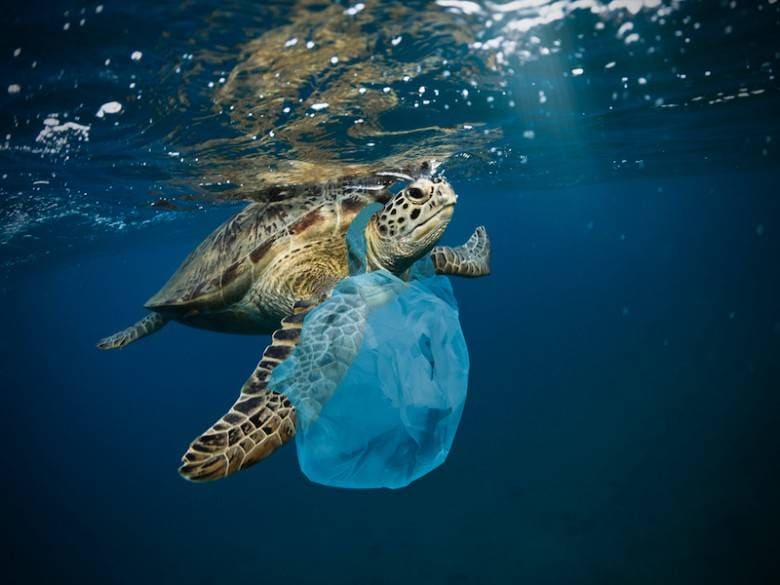
Subscribe for Free!
Join our newsletter to explore innovative sustainability initiatives, eco-friendly tips, and impactful activities

Join our newsletter to explore innovative sustainability initiatives, eco-friendly tips, and impactful activities
Strange planet dying from plastic!
August 31, 2022

What is this material anyway?
Plastic represents a mixture containing a base material (a polymer) that can be molded, shaped, generally hot and under pressure, to produce a semi-finished product or an object. Source: Plastics, the fact 2019 Plastics Europe.
What we are experiencing today
Plastic pollution is a major environmental concern. Rethinking the end-of-life of this otherwise practical material becomes a societal challenge. Nadia Auclair, President of Carbiolice, says: "Every year, 8 million tons of plastics end up in the oceans, and if nothing changes, by 2050, there will be more plastics than fish...". A reality we all know, a reality we overlook every day.
Types of marine pollution
Domestic pollution
Domestic pollution is caused by the hazardous products we dispose of in our sinks, bathtubs... After these products are not filtered in sewage treatment plants, wastewater is directly discharged into the sea.
Oil pollution
There are two types of oil spills, the first is called an oil spill, caused by tanker wrecks. The second type of discharge comes from men who deliberately release over 120 million tons of oil per year.
Rainwater pollution
Acid rains destroy forests but also the marine environment and pollute it. For example, if someone drops a pot of paint on the ground, the chemicals in the paint will enter the water cycle. Later, the rain falls polluted. So, hazardous products such as used oils, solvents should not be poured into the water because they evaporate and will fall as rain.
Chemical pollution
Hazardous chemicals are found in the sea and in soils. They come from discharges from sewage treatment plants, agriculture (in pesticides that are used), industry, transportation... Pesticides, metals, and other toxic substances are discharged every day and threaten the food chain.
Indeed, chemicals accumulate in all organisms. They first contaminate plant species, which are directly linked to the earth and feed on what it contains, then organisms that feed on plants. The phenomenon thus goes up the food chain and eventually affects the largest mammals and humans.
Agricultural pollution
Many pollutants are produced by agriculture. Chemicals (pesticides, insecticides) are used to kill insects that feed on these plantations or to make plants grow faster.
Using the water cycle, these chemical fertilizers all end up in the sea, and this produces the same effects as on land. Many fish die.
What is done on a large scale
Fortunately, awareness of environmental issues is growing and is prompting new progress: improving recycling, using renewable raw materials, rational use of materials, developing biodegradability... In parallel, new laws are coming into effect:
2020: limit overpackaging and develop compostable plastics
At the European level, the SUP (Single Use Plastic) directive also imposes a number of measures: stirrers, straws, and cotton buds have thus been banned from the European Union.
In response to these bans, and to "limit overpackaging and the use of single-use plastics", the Citizens' Convention also proposed in June 2020 to "develop bulk and deposits in distribution locations" and to promote "compostable biosourced packaging". Composting appears indeed as a real alternative to rethink the end-of-life of all plastics that cannot currently be recycled or reused because they are too thin, soiled, or made in multiple layers.
What is done on a small scale
In Algeria, many initiatives are being undertaken in this direction, citing the company Nrecycli as a concrete example of waste treatment. Other associations like Plogging Association Algeria, which is active in various fields, including environmental protection, demonstrate several awareness activities that are the driving force and trigger for a movement of awareness.
What should we do to help the sea?
The sea covers 75% of our planet, and this planet may be the only planet in the universe to have water. So, if we don't react, we and our environment will die.
Human activities are responsible for the deterioration of the seabed. So to help the sea, here are some simple gestures:
I do not throw hazardous products into the water.
I think before buying anything.
I try to learn more about the marine environment.
I adopt a respectful behavior towards marine environments.
Become actors of awareness or through innovative solutions?
Registration link: https://soolvit.com/save-sea-initiative
Article written by: Aicha KAOUS